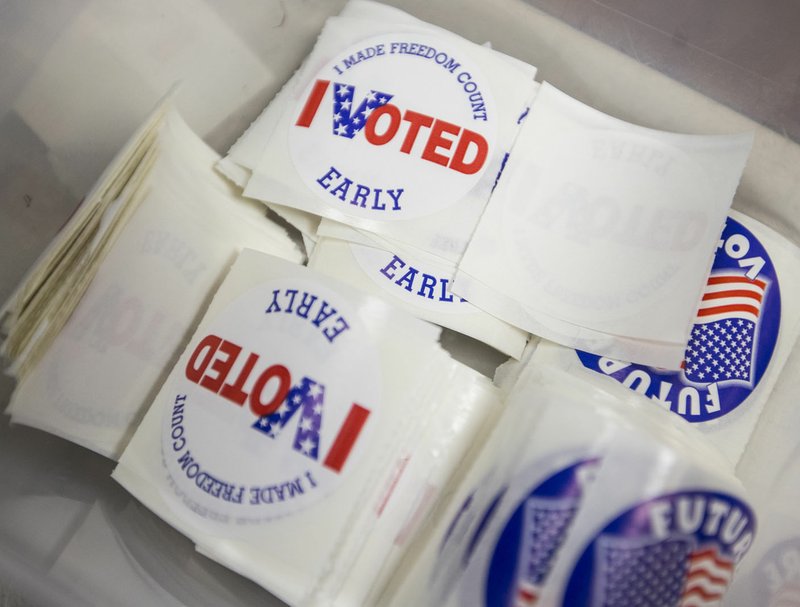A case pending before the state Supreme Court claims four state laws would disenfranchise voters who are poor, members of minority groups, immigrants or are dealing with chronic health problems.
Yet none of those laws, passed in last year's legislative session, led to more than a few ballots being rejected in the May 24 party primaries and nonpartisan judicial races, according to election coordinators for the state's three most populous counties. The Secretary of State's office -- which oversees elections but is a defendant in the lawsuit -- also said no problems with voting caused by these laws were reported.
Arkansas ranked last in the U.S. in both voter turnout and registration during the 2020 election, according to the latest report by the U.S. Election Assistance Commission.
Mireya Reith, executive director of Springdale-based immigrant rights group Arkansas United, said one of the goals of her group is to increase turnout and these laws create more obstacles to that. Her group is one of the plaintiffs in the lawsuit before the Supreme Court.
"There's already a lack of voter information in Spanish, and these laws just add to the confusion," Reith said Friday.
Her group will be able to track voter participation in the general election but lacked the resources to do that in the primary, she said.
"We know our community did not participate in mass in the primaries, though," she said.
The League of Women Voters of Arkansas is another of the plaintiffs in the case against the new laws.
"We are deeply concerned with a number of the newly adopted restrictions, but the case is pending before the Arkansas Supreme Court, and, while we await a decision, we have encouraged Arkansans to participate in the primary and general elections," President Bonnie Miller of Fayetteville said in a statement Friday.
The laws at issue in the lawsuit are:
• Act 249, which requires voters who fill out provisional ballots to submit photocopies of their IDs by noon on the Monday after Election Day for their votes to be counted. The photocopies must be presented to the county board of election commissioners or the county clerk under the new law. Those voters previously could give sworn statements at the polling place when casting a provisional ballot to ensure their votes were counted.
• Act 728 prohibits people from standing within 100 feet of a polling site except to vote or for another lawful purpose. Critics claim the law would prohibit such activities as handing out water or snacks to voters standing in long lines while waiting to vote.
• Act 736 introduced a requirement that a voter's signature on an absentee ballot be verified by checking the person's voter registration application. Before, state law allowed election workers to check multiple signatures. Several witnesses testified the change could present obstacles for many Arkansans, particularly those with ailments such as arthritis, which can make a voter's signature inconsistent.
• Act 973 moved the mail-in ballot deadline forward from the Monday before an election to the Friday before.
All three county election coordinators interviewed -- Kim Dennison of Benton County, Amanda Dickens of Pulaski County and Jennifer Price of Washington County -- said when a problem occurred May 24, it usually involved the photo-ID requirement.
A ballot is marked "provisional" when there is a problem, such as a voter failing to provide a form of photo ID prescribed for elections.
"It has to show your photo and your name and be issued by the state or federal government," Price said. "A driver's license, a military ID, a University of Arkansas student ID -- we get a lot of those -- or a passport, something like that," she said.
"Now a part of the law that is not well known is: If you don't have any of those but live in an assisted-care facility, the director of that facility can provide a statement verifying your ballot," Price said. "I'm going to go to assisted-living facilities before the election to give talks about that."
Washington County had 241 absentee ballots which were counted in the May 24 primary, according to election records. Eight absentee ballots lacked photo ID copies, she said. Of those eight, three voters got to the county clerk's office in time to get their provisional ballots validated and counted. Likewise, 14 voters who voted in person lacked proper ID at the time but three of them met the deadline to present identification later. This was from among 29,598 ballots cast in Washington County during the primary, records show.
Benton County had about 300 absentee ballots with 25 not having a photo ID included, Dennison said. Only a handful got their ballots validated, she said. The county clerk's office attempted to reach every one of the 25 by telephone, she said. Benton County's voter turnout for the election was 34,401.
About 20 of 300 provisional ballots lacked ID in Pulaski County, Dickens said. This was out of 28,051 votes cast there.
"Arkansas's successful primary election underscores what the attorney general has said all along and continues to argue: the challenged laws protect electoral integrity and ensure fair elections," said Amanda Priest, spokeswoman for Attorney General Leslie Rutledge, said in a statement Friday. The attorney general's office is defending the state in the Supreme Court case.

